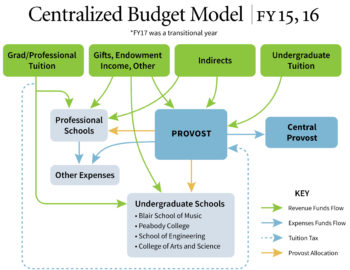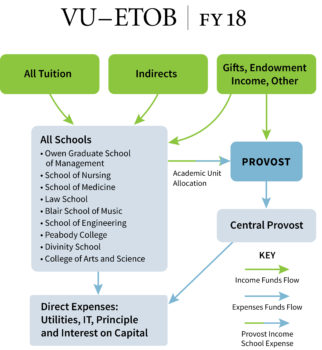Budget Season Springs Again
Dear colleagues,
As we approach April, many of us are getting ready to submit our personal tax returns. This often brings reflections on our household budgets and on what impact our taxpayer dollars have on our local, national, and even university initiatives. At the same time, here on campus, we are currently finishing up what I call the university “budget season.” By the end of April, each school and college’s proposed fiscal year (FY) 2019 summary budget of projected revenues and expenses will complete its review and approval cycle. We are also moving into the last quarter of FY18 and the end of our first full year in the new comprehensive “VU-ETOB” budget model for Academic Affairs. Thus, it is timely to reflect and review the progress we are making and what lies ahead.
Foremost, the university is in an incredibly strong position financially. Strategic investments continue in areas ranging from graduate education and research, to Immersion Vanderbilt, to faculty programs like TIPs and Chancellor Faculty Fellows. Coincidentally, we must continually be good stewards of our finances and we must make intentional and strategic decisions about where to allocate our resources. For every decision we make, we rely on our core principles, the university mission, and the Academic Strategic Plan to guide our investments and prioritizations and to ensure we are positioned for success.
The VU-ETOB budget process exemplifies the shared governance approach that the university uses for decision-making. Although the process may be somewhat distinct for each area, it is truly bottom-up starting with units, departments, programs, centers, schools and colleges drafting budget proposals that prioritize, make choices and strategically plan for the future. To boil it down to the basics, the Academic Affairs budget process goes like this.
- December – School and college departments and units prepare their fiscal year budgets for submission to their respective deans. Likewise, each vice provost drafts the fiscal year budget proposal for their unit which becomes part of the central Provost budget.
- January – After deliberations at the school and college level, the deans submit to the Provost an overall budget proposal with high-level revenue and expense categories; such as tuition, indirect costs, endowment distributions, salaries/stipends, fringe benefits, supplies, IT, or utilities. The Provost reviews and discusses the proposals with the deans. The central Provost budget is reviewed as well.
- February – The Provost assembles all school and college budgets and the central Provost budget into one overall Academic Affairs budget that is presented to the Chancellor for review and approval.
- April – The budget and proposed tuition, rates, and mandatory fees are subsequently presented to the Board of Trust for review and approval.
- April – The Provost informs each dean of their approved fiscal year budget.
- July 1 – The new fiscal year begins.
The timeline for the process is exactly the same as it was under the previous centralized budget model. And, as was the case before, once approved, budget implementation is at the dean’s discretion. This means that during a given fiscal year, as long as the school or college achieves its approved budget bottom line, the dean may reallocate resources throughout the year as needs arise. For example, this might involve shifting expenses between salary and supply categories, or deploying new revenues from annual giving.
Under the new VU-ETOB budget model, all revenues flow directly to the school or college from which it was generated and each school and college is therefore responsible for directly paying their own expenses. The VU-ETOB model creates incentives for strategic growth planning, for finding efficiencies, and for genuine consultation on future shared activities. I wrote about the benefits of this new model in this essay in September 2016. See the inset diagram that compares the models.

A further key distinction is that the former “Provost Tuition Tax” of 12.4% is no longer collected. Instead, the schools and colleges directly pay their share of the central Provost’s academic unit budgets through an allocation that goes toward, for example, libraries, enrollment affairs, student health and wellness, and sponsored research administration support. I’ve worked closely with the deans to transparently create the right formulas by which these academic unit allocations are determined. For example, the Sponsored Program Administration (SPA) office support is calculated utilizing total grant and contract revenues for each school or college to determine the proportionate share of research administration expenses that should be allocated to each.
Once budgets are approved at the end of April, the deans are charged with communicating the specifics of their FY19 budget to their units. As a general resource, I have also posted a set of FAQs related to finance in higher education on my website. You may also want to reach out to your Faculty Senate colleagues who receive a briefing every fall from Brett Sweet, Vice Chancellor for Finance. For those who want to learn even more about how higher education budgets work, Vice Chancellor Sweet’s office sponsors the “The Business of VU” program in the fall. Information on how to apply for the next program will be available via MyVU in April.
With the VU-ETOB model, some have asked how we ensure collaborations and strategic investments continue across all schools and colleges. With the Academic Strategic Plan, we’ve created a framework that rewards collaboration and fosters multi-school and college engagement and decision-making. Of note, the Chancellor and I directly support strategic investments across the university. Moreover, initiatives are put forward using faculty committee-driven processes, with multiple opportunities for community input, overall review, and consensus by the deans. You can see this process at work in initiatives ranging from the Trans-Institutional Programs, Data Science Visions, Graduate Education and Research, and our International Strategy.
In closing, it is important to recognize that the operating models for each school and college are unique and the strategies each will take to chart their course ahead will differ. However, what we all have in common is a commitment to excellence in learning and discovery. I look forward to supporting each and every one of you as we forge ahead.
Sincerely,

Susan R. Wente
PREVIOUS OPEN DORE ISSUES
In case you missed it …
Tone at the Top: Fostering a Culture of Respect for Women and for All
Building for the Future
Reflecting Forward From 2017 to 2018
SkyVU: Ready for Landing?
Education Technologies: Transforming Discovery and Learning
All past issues
|
![Provost - Open Dore E-Newsletter [Vanderbilt University]](https://cdn.vanderbilt.edu/vu-URL/wp-content/uploads/sites/119/2019/01/19145739/open-dore-email-header.jpg)








 The
The  Earlier this month, leading neuroscientist
Earlier this month, leading neuroscientist 
